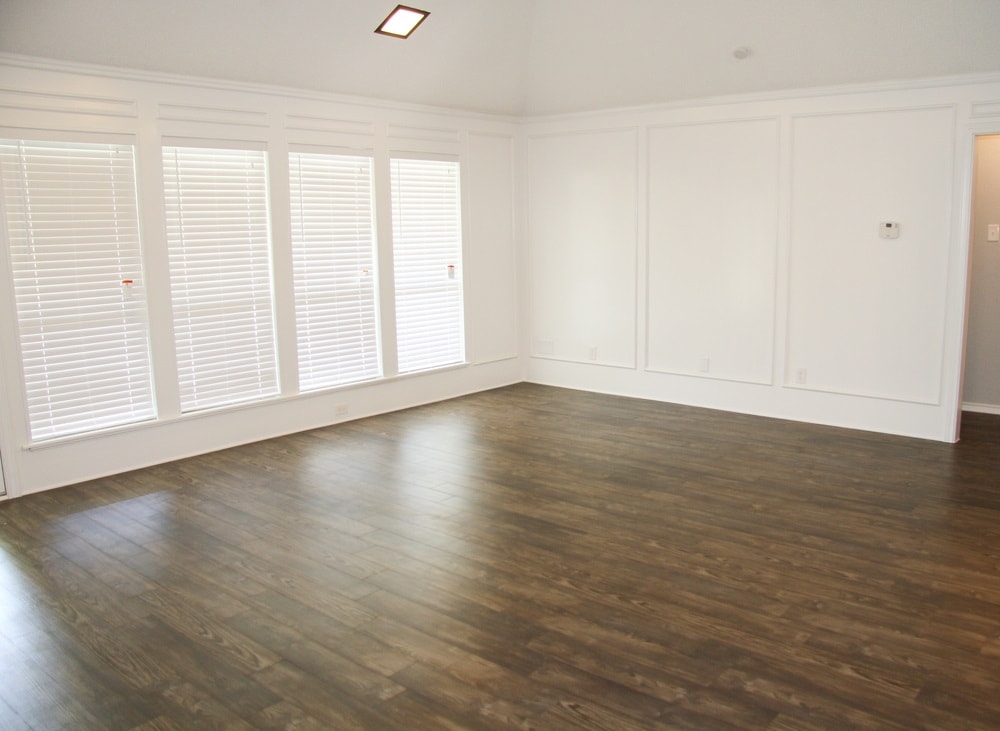Why Vinyl Flooring Works for the Housing Industry

Vinyl plank is fast becoming the new, trendy alternative to expensive hardwood floors and carpet in the rental housing industry.
Hard-surface floors are more and more becoming the choice over carpet as property owners seek to lower turnover costs and give homes a more stylish look to attract and keep residents. Many high-end styles of plank have the look and feel of stone, wood and ceramic tile.
“The biggest thing right now is the shift from soft-surface goods like carpet into the realm of hard-surface throughout the unit,” said Tim Skufca, National Sales Director of Multifamily for Sherwin-Williams. “Specifically, (apartments are) moving from carpet into vinyl plank and not just in the living area, but moving into the bedroom areas.”
Skufca says that about half of the top real estate investment trusts in the country are installing vinyl plank at properties in varying scales. A big reason why is that the flooring doesn’t have to be replaced as often as carpet, enabling a better return on investment for the owner. The average life of vinyl plank is 10 years or more, compared to about two to five years for carpet.
Vinyl plank is a better value in the long term
Like many products, vinyl flooring has gotten better over the years since becoming a household fixture following Chicago's Century of Progress Exposition in 1933. At that time, vinyl was economical, stood up to heavy traffic and was easier to maintain. The same is true today, and although the plank variety is more expensive than roll flooring and carpet, it offers a high-quality look that lasts.
For property owners and third-party managers who frequently replace carpet as homes turn, vinyl plank may be a good option, says Skufca. Sherwin-Williams, which provides flooring services to the leasing sector, is fielding more requests from properties that want to transition away from carpet. All or portions of homes are being recovered with vinyl plank, which is showing up in areas where carpet has been a more traditional selection.
“From the ownership perspective, although the upfront costs can be as much as three times greater in comparison to carpet, the long-term cost savings provides significant upside for the owner,” Skufca said. “It’s all part of that unit repositioning that’s going on.”
Skufca said that plank offers the look of trendy flooring without the high investment that goes along with wood or stone floors. The extra investment in plank or carpet also helps landlords justify higher rents. Meanwhile, the resident gets a little more stylish abode without a hefty rent that comes with, say, a hardwood floor.
Plank is easy to repair and has the look, feel of expensive flooring
Vinyl plank is much more forgiving than other surfaces, especially carpet. Water resistant finishes are getting more and more sophisticated. At January’s Dallas floor market show, at least two manufacturers were touting new lines of 100 percent waterproof vinyl plank.
Plank comes in a variety of colors, finishes and textures and installs much like wood flooring. An adhesive backing secures the material to the floor and is resilient enough that planks can be easily replaced, Skufca said.
“One of pros from the management company perspective is the ease of repair for this product,” he said. “When using carpet, if the carpet is damaged or stained, you have to replace the entire unit of carpet. With vinyl plank, if there is a board that is damaged or scratched, you can replace to the one board as opposed to the entire unit. You get significant long-term cost savings per unit when it relates to repairs and replacement.”
Also, vinyl plank is quiet like carpet. And there is no shortage of selections. One leading manufacturer of vinyl plank offers 112 choices in color and style, either simulated wood or tile.
In the long run, Skufca says, vinyl plank may be a wise flooring solution over carpet for some properties.
“From a resident perspective, hard-surface flooring looks a lot better than carpet,” he said. “It’s easier to maintain, it’s easier to clean, has a more home-y feel. Just all in all is a better product for both the owner and resident.”
(Image Source: Shutterstock)







